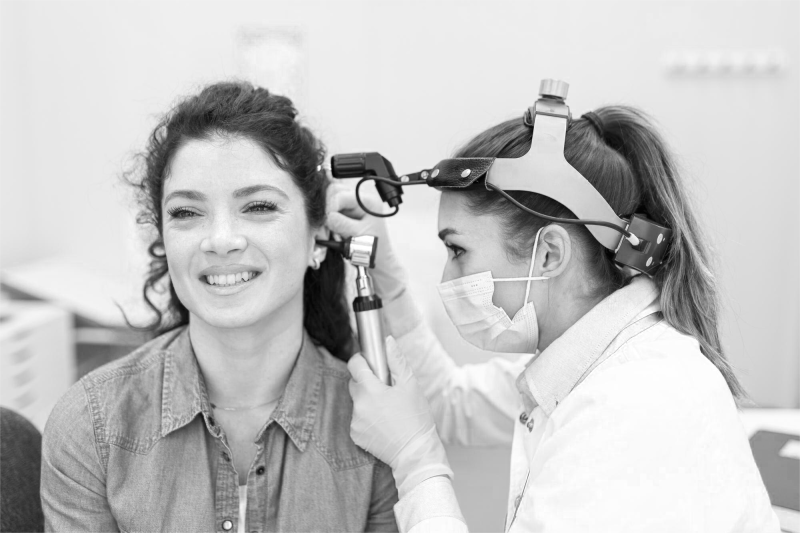Many people don’t think about their ear health until they experience dizziness, unsteadiness, or hearing loss.
Yet, the inner ear plays a crucial role in physical coordination and maintaining balance. As you age or face environmental stressors, even subtle changes in this system can impact your mobility, independence, and overall quality of life.
This guide offers evidence-based, actionable steps to improve ear health, enhance balance and coordination, and promote longevity through simple, daily habits.
Read more to take proactive steps to improve your ear health and safeguard your mobility and overall longevity.
The connection between ear health and physical balance
Inside your inner ear is the vestibular system, a sensory apparatus that detects motion and spatial orientation.
It sends signals to the brain that help control eye movements, posture, and stability. The brain also integrates this data with information from your vision and proprioception (the body’s ability to sense its position), forming a complex balance network.
When the vestibular system is disrupted due to age, illness, or injury, it can result in disorientation, dizziness, or loss of balance. Even mild dysfunction can affect daily tasks such as walking, driving, or bending down.
Supporting this, a study found that among adults who had experienced at least one fall in the past year, approximately 61% showed signs of vestibular dysfunction. This conclusion was based on various clinical assessments, including vestibulo-ocular reflex (VOR) tests, which evaluate how well the eyes stabilize on a target while the head is moving.
These individuals also demonstrated significantly poorer gait performance compared to those without vestibular issues. This demonstrates the crucial role of the vestibular system in maintaining balance and preventing falls across various age groups.
Take a closer look at why ear health matters more than you might think, especially when it comes to balance and daily movement.
Common conditions affecting balance
Several medical conditions can disrupt the vestibular system or other components of the balance pathway, leading to dizziness, unsteadiness, and an increased risk of falls. Some of the most common include:
- Benign Paroxysmal Positional Vertigo (BPPV). Often triggered by head movements, BPPV causes brief but intense dizziness. It’s usually due to tiny calcium crystals (otoconia) dislodging and floating into the inner ear canals.
- Meniere’s Disease. Characterized by episodes of vertigo, tinnitus, and hearing loss, Meniere’s is linked to abnormal fluid buildup and pressure changes within the inner ear.
- Vestibular Neuritis or Labyrinthitis. These are inflammatory conditions, often viral, that affect the inner ear nerves responsible for balance and hearing.
- Presbyvestibulopathy. Age-related decline in vestibular function contributes to instability and falls in older adults.
If left unaddressed, these conditions can worsen, limiting movement and reducing confidence in daily life.
How poor ear health increases fall risk and reduces mobility
According to the Centers for Disease Control and Prevention (CDC), one in four adults aged 65 and older experiences a fall each year.
Falls are the leading cause of injury-related death among the elderly, second only to traffic accidents. A major contributor is balance disorders, often caused by the gradual decline of the sensory system, including the vestibular system in the inner ear, which is essential for maintaining balance.
A study found that even mild hearing loss triples the risk of falling. Theories suggest that reduced auditory input increases cognitive load, making it harder for the brain to manage postural control. In addition, inner ear dysfunction directly impairs balance feedback.
In younger individuals, poor ear health can lead to motion sickness, delayed reaction times, and reduced coordination in sports or while driving.
Read more: How Smart Eating Habits Can Add Years to Your Life
How to improve ear health for better coordination
Ear health is not a fixed trait—it can be supported and improved. Simple daily strategies can make a big difference over time.
So, how do you put all this into action? The following section provides you with simple steps to start improving your ear health today.
Practice daily ear care habits
Simple daily steps may seem minor, but they can make a big difference. They help protect your hearing, support your balance, and lower your risk of falling, especially as you get older.
If you often feel dizzy, are exposed to loud environments, or want to stay active and independent, these habits are worth building. The best part? They’re easy to start and require no special tools.
- Don’t use a cotton swab. These can push wax deeper into the ear canal and cause injury. Use a warm, damp cloth to clean the outer ear only.
- Limit exposure to loud noise. Prolonged or repeated exposure can damage inner ear structures. Use ear protection, such as earplugs or noise-canceling headphones, in noisy environments.
- Keep the volume low when using headphones. High volume, especially over long periods, can cause permanent hearing damage. Follow the 60/60 rule—no more than 60% volume for 60 minutes at a time.
- Take listening breaks. Giving your ears rest from continuous noise reduces the risk of auditory fatigue and long-term damage.
- Stay hydrated and manage blood pressure. Good circulation supports inner ear function, which is essential for both hearing and balance.
- Be cautious with medications. Some drugs can affect hearing or balance (ototoxic). Always consult your doctor if you notice symptoms after starting a new medication.
Pro tip: If you’re frequently exposed to loud environments (such as concerts, construction sites, or prolonged headphone use), consider using noise-canceling devices or hearing protection to prevent potential damage.
Engage in balance-building exercises
Good balance isn’t just about preventing falls—it’s key to moving confidently through daily life. Training your vestibular system with targeted exercises can help reduce dizziness, improve coordination, and maintain your balance as you age.
Even a few minutes a day can make a meaningful difference. Below are some simple movements to help build better balance and support long-term ear health.
- Vestibular rehabilitation therapy (VRT). A specialized exercise program that improves gaze stability, balance, and motion sensitivity. Often recommended after vestibular neuritis or BPPV.
- Tai Chi and Qigong. These slow, meditative movements promote body awareness, alignment, and postural control.
- Yoga poses. Poses such as Tree Pose, Warrior III, or Half Moon Pose can challenge your balance while strengthening your core.
- Simple home routines. Stand on one leg while brushing your teeth or practice walking heel-to-toe in a straight line.
Consistent balance exercises not only improve stability but also reduce anxiety and fear of falling, which is common after an episode of vertigo.
Support ear health through nutrition and lifestyle
What you eat and how you live your daily life can have a direct impact on your hearing and balance. Just like your heart and brain, your ears rely on good blood flow, stable nerve function, and minimal inflammation. All of which are influenced by nutrition and lifestyle choices.
Making a few intentional lifestyle changes can go a long way in preserving your ear health. Here are some practical ways to start.
- Magnesium helps protect the inner ear against noise-induced hearing loss by countering oxidative damage.
- Potassium supports the fluid regulation in the inner ear and helps transmit nerve signals.
- Vitamin D is crucial for calcium metabolism and has been linked to reduced risk of BPPV in older adults.
- Omega-3 fatty acids found in fish oil have been associated with a lower risk of age-related hearing loss.
- Zinc supports immune function and may reduce the duration of ear infections.
Other lifestyle tips:
- Stay hydrated to maintain fluid balance within the inner ear.
- Sleep well, as vestibular symptoms often worsen with fatigue.
- Avoid chronic stress, as it can exacerbate tinnitus and dizziness by increasing cortisol and adrenaline levels.
- Limit alcohol and caffeine, as these can dehydrate and affect inner ear function.
Learn more: Amanda Shiffler: The Joy and Benefits of Growing Your Own Herb Garden | On the House #31
When to seek medical attention
Sometimes, minor symptoms can signal a more serious underlying issue. Ignoring early signs may delay proper treatment and worsen the condition. Knowing when to get help is just as important as daily care.
Don’t dismiss subtle warning signs. See a doctor or ENT specialist if you experience:
- Persistent dizziness or vertigo. If it interferes with your daily life or worsens over time, it may signal an inner ear or neurological issue.
- Sudden or gradual hearing loss. Whether it happens in one ear or both, hearing loss—especially if rapid—requires prompt evaluation to prevent permanent damage.
- Tinnitus (ringing, buzzing, or humming). While often harmless, persistent tinnitus can indicate underlying ear or circulation problems that need attention.
- Ear pain, discharge, or fullness. These may be signs of infection, blockage, or eustachian tube dysfunction that a professional should address.
- Difficulty walking in the dark or on uneven ground. Trouble with balance in low visibility may indicate vestibular dysfunction, which affects coordination and stability.
These may indicate serious but treatable conditions, such as inner ear infections, tumors, or degenerative vestibular diseases.
Monitoring your hearing and balance over time
Ear health isn’t something you check once and forget. Just like vision or blood pressure, it needs regular monitoring, especially as you age or if you’re at higher risk. Catching small changes early can help prevent bigger problems down the line.
Here are simple steps to help you stay proactive:
- Log symptoms in a balance and hearing diary. Tracking dizziness, ringing, or changes in hearing helps you and your doctor identify patterns, triggers, and progression over time.
- Schedule audiograms regularly. Hearing tests every 1–2 years are recommended if you’re over 50, work in noisy environments, or notice changes in hearing. Early detection makes treatment more effective.
- Ask about vestibular function tests. If you’ve experienced recent falls, dizziness, or trouble with motion, these tests help assess the balance system in your inner ear.
Tracking changes early allows for timely intervention and more effective management.
In conclusion
Neglecting ear health can do more than limit your hearing
It can affect how steady you feel, how confidently you move, and how safe you are in everyday life. When your inner ear is off balance, even small tasks like climbing stairs or standing still can feel uncertain.
The good news is, you don’t need significant changes. Simple steps such as those discussed above can make a real difference. These small habits help you feel more balanced, more confident, and better prepared to tackle your day.
Start today. Feeling strong and balanced begins with taking care of even the smallest things.
If you want to see more resources on the ears, check out the Longevity Science Labs. The lab uses the research of the Institute for Life Management Science to produce courses, certifications, podcasts, videos, and other tools. Visit the Longevity Science Labs today.
Photo by stefamerpik on Freepik


